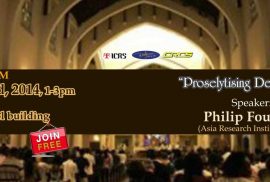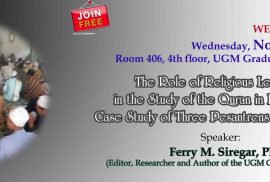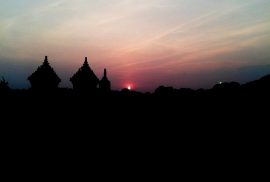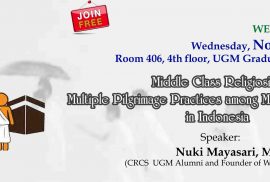
Abstract
Perhaps the prickliest subject in the emerging field of ‘religion and development’ concerns the question of proselytisation. The melding of religious propagation with development and humanitarian activity is widely regarded as immoral, illegitimate and distasteful. This separation has become such a prominent article of faith in development circles that any suggestion otherwise is tantamount to heresy.
In this seminar I seek to re-think this apparently settled consensus. Precisely because it is seen as such a problem proselytisation is a pivotal concept to think with in research into the cultural politics of development. Drawing on anthropological critiques of the category of ‘religion’ I go beyond examining the pervasive ways that religious and development agendas have been entangled to explore the question of whether development itself is inherently proselytising.





 Senja itu di halaman candi, kami mahasiswa CRCS menggelar pengetahuan. Beberapa buku dengan kertasnya sudah menguning, beberapa jilid stensilan dan beberapa lembar kertas fokokopian. Karya-karya seorang romo Jesuit kelahiran Amsterdam 1916 itu menindih rumput yang mengering akibat kemarau yang tidak segera diakhiri oleh turunnya hujan. Pada usia 20 tahun, ia –Jan Bakker atau dikenal sebagai Rahmat Subagya, berlayar menuju Nusantara yang selanjutnya menjadi persemaian benih pikirannya tentang agama-agama asli dan agama Islam.
Senja itu di halaman candi, kami mahasiswa CRCS menggelar pengetahuan. Beberapa buku dengan kertasnya sudah menguning, beberapa jilid stensilan dan beberapa lembar kertas fokokopian. Karya-karya seorang romo Jesuit kelahiran Amsterdam 1916 itu menindih rumput yang mengering akibat kemarau yang tidak segera diakhiri oleh turunnya hujan. Pada usia 20 tahun, ia –Jan Bakker atau dikenal sebagai Rahmat Subagya, berlayar menuju Nusantara yang selanjutnya menjadi persemaian benih pikirannya tentang agama-agama asli dan agama Islam. Pada bagian lain, ia melemparkan kritik yang tajam atas pemaknaan Pancasila hanya menjadi semboyan belaka, yang seakan-akan tak ada isi objektif. Sehingga bisa dipahami dinamika bagaimana Pancasila dimaknai pada oleh masyarakat dalam konteks waktu saat karya itu disusun.
Pada bagian lain, ia melemparkan kritik yang tajam atas pemaknaan Pancasila hanya menjadi semboyan belaka, yang seakan-akan tak ada isi objektif. Sehingga bisa dipahami dinamika bagaimana Pancasila dimaknai pada oleh masyarakat dalam konteks waktu saat karya itu disusun. Home Minister Tjahjo Kumolo has stated that followers of minority faiths can leave the religion column on their KTP (identity cards) blank. Yet the real problem beyond the debate of leaving the column blank or removing it altogether not only regards equality and civil rights for followers of aliran kepercayaan (indigenous religions or local faiths) — but the definition of agama (religion) itself.
Home Minister Tjahjo Kumolo has stated that followers of minority faiths can leave the religion column on their KTP (identity cards) blank. Yet the real problem beyond the debate of leaving the column blank or removing it altogether not only regards equality and civil rights for followers of aliran kepercayaan (indigenous religions or local faiths) — but the definition of agama (religion) itself. There are two reasons why some Muslims in Jakarta reject a non-Muslim governor, like Basuki “Ahok” Tjahaja Purnama. The first is the literal interpretation of the scriptures. The second is the matter of majoritarian psychology.
There are two reasons why some Muslims in Jakarta reject a non-Muslim governor, like Basuki “Ahok” Tjahaja Purnama. The first is the literal interpretation of the scriptures. The second is the matter of majoritarian psychology.

